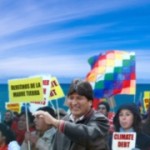23 April 2010:The People’s World Conference on Climate Change and the Rights of Mother Earth convened in Cochabamba, Bolivia, from 19-22 April 2010.
An initiative of Bolivian President Evo Morales, the Conference provided a forum to discuss the structural and systemic causes of climate change and propose substantive measures that facilitate the well-being of mankind […]
 23 April 2010:The People’s World Conference on Climate Change and the Rights of Mother Earth convened in Cochabamba, Bolivia, from 19-22 April 2010. An initiative of Bolivian President Evo Morales, the Conference provided a forum to discuss the structural and systemic causes of climate change and propose substantive measures that facilitate the well-being of mankind in harmony with nature.
23 April 2010:The People’s World Conference on Climate Change and the Rights of Mother Earth convened in Cochabamba, Bolivia, from 19-22 April 2010. An initiative of Bolivian President Evo Morales, the Conference provided a forum to discuss the structural and systemic causes of climate change and propose substantive measures that facilitate the well-being of mankind in harmony with nature.
Representatives of civil society, the scientific community, governments, academia and social, indigenous, environmental and cultural organizations participated in the event. Participants heard a message from UN Secretary-General Ban Ki-moon, which was read by Alicia Bárcena, Executive Secretary of the Economic Commission for Latin America and the Caribbean (ECLAC). In the message, Ban stressed that the UN seeks dialogue, inclusiveness and transparency in the global climate discourse. He also referred to climate change as an ethical issue, with serious implications for the well-being of present and future generations, and requiring a global solution that takes into account the views and needs of all who share Mother Earth. Bárcena conveyed the desire of the Secretary-General that Conference participants provide constructive, positive and viable inputs to the 16th session of the Conference of the Parties (COP 16) to the UNFCCC, scheduled to take place at the end of 2010 in Mexico.
Ahmed Djoghlaf, Executive Secretary of the Convention on Biological Diversity (CBD), also delivered a statement to the Conference, noting that since 2007, the CBD Secretariat has drawn the international community’s attention to the impacts of climate change on indigenous and local communities. He pointed to ecosystem-based adaptation for integrating the use of biodiversity and ecosystem services into an overall adaptation strategy; generating social, economic and cultural co-benefits; drawing on traditional knowledge; and contributing to biodiversity conservation.
The final 10-page declaration adopted at the Conference calls on developed countries to: commit to quantified emission reductions that will limit the global temperature increase to a maximum of 1°C; bear the costs and ensure technology transfer necessary to compensate developing countries for their lost development opportunities due to a compromised atmosphere; and take responsibility for climate change migrants, through the conclusion of an international agreement.
The final declaration also urges the approval of a second commitment period under the Kyoto Protocol in which developed countries commit to reduce domestic emissions by at least 50% against 1990 levels without resorting to market-based mechanisms. It further calls for the recognition and integration of the UN Declaration on the Rights of Indigenous Peoples in the climate change negotiations. The final declaration also rejects a definition of forests that includes plantations and condemns market-based mechanisms such as reducing emissions from deforestation and forest degradation in developing countries (REDD), conservation, sustainable management of forests, and stock enhancement in addition to REDD (REDD+), and all terrestrial carbon in addition to REDD+ (REDD++), as violating the right to the prior informed consent of indigenous peoples and national sovereignty.
The final declaration foresees that a second People’s World Conference on Climate Change and the Rights of Mother Earth will be held in 2011 to discuss the results of COP 16. [Conference Website] [Conference Blog] [ECLAC Press Release] [Djoghlaf’s Speech]